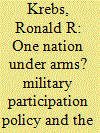|
|
|
Sort Order |
|
|
|
Items / Page
|
|
|
|
|
|
|
| Srl | Item |
| 1 |
ID:
069888


|
|
|
|
|
| Publication |
2005.
|
| Summary/Abstract |
Students of comparative military organizations have advanced three hypotheses to explain when armed forces adopt more liberal manpower policies: when a major security threat looms, when the military professionalizes, or when the surrounding society grows more tolerant of difference. This article argues that all three are theoretically and empirically problematic: they potentially have much to contribute, but only in conjunction with a perspective that is more appreciative of the centrality of political processes. Enduring reform of the military's participation policies is more productively viewed through the lens of the struggle over national and communal identity. To illustrate the power of this alternative approach, this article reconsiders cases commonly cited in support of the existing hypotheses: the racial desegregation of the U.S. military, the integration of the Druze into the Israel Defense Forces, and the imperial and independent Indian armies' policies with respect to what the British termed "class."
|
|
|
|
|
|
|
|
|
|
|
|
|
|
|
|
| 2 |
ID:
069885


|
|
|
|
|
| Publication |
2005.
|
| Summary/Abstract |
The belief that globalization enhances peace, a central tenet of liberal theory, enjoys substantial support in recent scholarship on trade and conflict. To conclude that liberalism is right, however, is premature and wrong. Liberal theory is not sufficiently grounded in international trade theory to show how globalization generates constraints on military force, nor does it adequately link these constraints to strengthened peace. This article uses the Heckscher-Ohlin model of trade to connect globalization's economic effects to increased constraints on military force and then explores how, in the nineteenth century, globalization affected European peace. As liberal theory predicts, globalization generated substantial constraints on military force in prewar Europe. Yet there are important flaws in liberalism's logic linking these constraints to strengthened international peace. Contrary to liberal theory, globalization did not strengthen prospects for peace in prewar Europe but was a major cause of the First World War.
|
|
|
|
|
|
|
|
|
|
|
|
|
|
|
|
| 3 |
ID:
069883


|
|
|
|
|
| Publication |
2005.
|
| Summary/Abstract |
American foreign policy analysts have generally viewed World War II as the most important of the six wars the country fought in the twentieth century. By entering this war, so the argument goes, the United States prevented the gravest geopolitical threat to its security-German and Japanese hegemonies in Eurasia-from materializing. Careful reexamination of the best case for U.S. entry into World War II, made by Nicholas Spykman in 1942, demonstrates that the traditional view is misplaced: the United States could have remained secure over the long term had it not entered the war and had it allowed Germany and Japan to win. Its standard of living and its way of life, however, would most likely have suffered. Avoidance of those two outcomes was the real reason to have entered the war. The implications of this analysis for balance of power theory and current American grand strategy are spelled out.
|
|
|
|
|
|
|
|
|
|
|
|
|
|
|
|
| 4 |
ID:
069884


|
|
|
|
|
| Publication |
2005.
|
| Summary/Abstract |
World culture shapes the way states generate military power: norms of conventional warfare provide the template for military organization, and norms of humanitarian law define what is morally acceptable in military operations. Sometimes, however, local strategic circumstances can challenge these worldwide technical scripts and moral codes for military action. Accordingly, this article advances an approach—cultural adaptation theory—that accounts for the role of power and politics in the worldwide normative structuring of military action. This theory explains how actors may modify their military practices in response to rising threats, in ways that avoid norm violation. Two case studies explore this theory: Irish military organization in the lead up to the Second World War, and NATO air operations in the Kosovo war. Some tentative conclusions are reached regarding suboptimal organization by weak states and operational restraint by powerful states. Overall, the article advances the case for dialogue between constructivist and rationalist approaches to security studies.
|
|
|
|
|
|
|
|
|
|
|
|
|
|
|
|
|
|
|
|
|